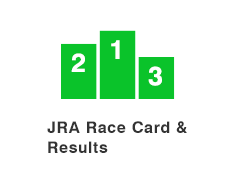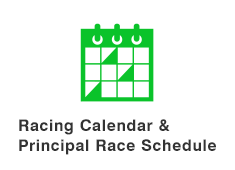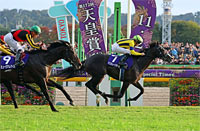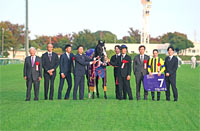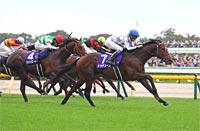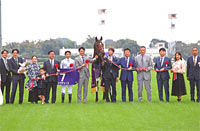2020 News
Tenno Sho (Autumn) (G1) - PreviewThis year, as if to make up for the havoc wreaked by COVID-19, racing in Japan has been nothing short of spectacular. The year has given rise to two Triple Crown champions, both unbeaten – Daring Tact for the fillies treble two weeks ago and Contrail last week, when he topped the Grade 1 Kikuka Sho (Japanese St. Leger) field. This week, without a breather, comes the Grade 1 Tenno Sho (Autumn). Sunday, Nov. 1 marks the 162nd running of the “Emperor’s Cup,” which is held twice a year, at Kyoto in the spring and at Tokyo in the fall. For Sunday’s race, run over 2,000 meters of turf, 12 horses have been nominated including seven-time Grade 1 winner Almond Eye. A total of seven Grade 1 winners will be participating, including double Tenno Sho (Spring) winner Fierement and Chrono Genesis, who crushed the competition in the Grade 1 Takarazuka Kinen at the end of June. Ages range from 4 to 6, with three females and one gelding competing against the boys for a share of the JPY325 million purse, with a top prize of JPY150 million. Only two graded races are run over the Tokyo 2,000 meters and the course is considered to be one of the most difficult. The race starts in the pocket just past the grandstand, and there are only 130 meters until the first turn. Weights are set, with 4 year olds & up carrying 58 kg, fillies and mares 56 kg. The Tenno Sho (Autumn) is the 11th race on the Sunday card of 12 at Tokyo. Post time is 3:40 p.m. Here’s a look at the field’s standouts. Almond Eye – A rundown of the feats of this 5-year-old daughter of Lord Kanaloa makes for quite a roll call. In 2018, Almond Eye captured the filly triple crown and then, the same year, triumphed in the Japan Cup in association with LONGINES, before flying off to Dubai to ace the Grade 1 Dubai Turf. Last year, she took first in this race, finishing three lengths ahead of runner-up Danon Premium. This year began with a trip to Dubai, but Almond Eye was forced to return unraced when the Meydan meet was canceled. Her first start of 2020 was the Victoria Mile on May 17, which she won with a blistering final three-furlong time of 32.9 seconds, then returned to Tokyo June 7 for the Yasuda Kinen. A bit late at the break, she traveled further back than usual and finished a not-so-close second. The going, slightly heavy, “was not to her liking,” says trainer Sakae Kunieda. The trainer says Almond Eye has since then had the same schedule she had last year. The summer was spent refreshing at Northern Farm Tenei in Fukushima and the mare returned to the training center on Oct. 2. “Last week she looked a bit heavy but her breathing wasn’t bad. Her movement was the usual,” said Kunieda. “With this field, I expect the pace to be slow, so I’m hoping she’ll leave the gate relatively well and have a smooth trip.” Almond Eye has made top three in all her seven starts at Tokyo and won five times, four of those in Grade 1s. Christophe Lemaire, who has ridden all but one of the mare’s 13 career outings, is pegged for the ride Sunday. Chrono Genesis – If anyone has a fair chance of beating Almond Eye to the finish line, it can be the 4-year-old filly Chrono Genesis. A year after Almond Eye swept the filly triple crown, Chrono Genesis posted 3-3-1, capping the trio with a win of the 2,000 meters Shuka Sho, her first Grade 1 victory. Less than a month later, she went up against older females in the Queen Elizabeth II Cup (2,200 meters, G1) and came in fifth only 0.3 seconds off the winner. She started 2020 off romping to a win of the Kyoto Kinen (2,200 meters, G2), lost by a neck next out in the Grade 1 Osaka Hai, and came back to claim the Takarazuka Kinen by six lengths. She returns after four months off but is three for three in her previous starts after layoffs and her record at Tokyo is also favorable with two wins out of three starts. Sunday, Almond Eye and Chrono Genesis are set to meet for the first time. The Bago-sired filly is highly consistent and she’s also well suited to the distance, with her last three wins over the past year all at 2,000-2,200 meters. Though Chrono Genesis has won over fast ground, she will prefer a bit of spring to the ground. Danon Kingly – The 4-year-old Deep Impact colt Danon Kingly suffered his first finish out of the top three last out with a seventh-place performance in the Yasuda Kinen June 7. Second by a head in the Satsuki Sho (Japanese 2000 Guineas), second by a neck in the Tokyo Yushun (Japanese Derby), Danon Kingly has narrowly missed being crowned winner in his previous five Grade 1 bids. In the Osaka Hai this year he was but one-tenth of a second behind the winner and his Yasuda Kinen time was 0.8 seconds slower than the first-place Gran Alegria. The uncharacteristic loss is being attributed to the going and Danon Kingly’s first time over anything but a fast track. Trainer Kiyoshi Hagiwara says the nearly five months from the colt’s last start shouldn’t pose a problem. “He usually needs quite some time to recover from a race and, believing he can do well returning without a prep, I decided to go directly to the Tenno Sho (Autumn). I do have some concerns regarding the distance but think he can do well if he runs his own race.” Danon Kingly’s five wins so far have all come at the mile or 1,800 meters. Fierement – The 5-year-old Fierement, sired by Deep Impact, is a two-time winner of the Tenno Sho (Spring), the longest JRA Grade 1 race on the flat. Nonetheless, Fierement was successful over 1,800 meters early in his career, when he notched 1-1-2 in his first three starts, including his debut at Tokyo, his only start at the venue. Fierement has, however, not raced in six months. He was slated to kick off his autumn campaign with the Sept. 27 Sankei Sho All Comers (2,200 meters, G2) at Nakayama, but the plans were scratched when he ran a fever. Trainer Takahisa Tezuka says, “He ran a fever the day before his final fast work, so not wanting him to overdo it, I gave him time off and changed my sights to here. I don’t think bringing him up to peak again has had any ill effect and he’s leaner now than he was before his last start.” Tezuka believes the wide-open Tokyo course will suit him, and that, unless the final-stage times are extraordinarily fast, Fierement will be able to do him proud. Yuichi Fukunaga is expected to be partnered with Fierement for the first time. Kiseki – Not to be written off is Kiseki, who finished third here two years ago, then followed that up with a second to Almond Eye in the 2018 Japan Cup. After last year’s second in the Takarazuka Kinen, Kiseki traveled to France and didn’t race in Japan until the Arima Kinen (The Grand Prix), where he finished fifth. This year he has raced ranging from 2,200 to 3,200 meters and returned in the fall with the Kyoto Daishoten (2,400 meters, G2) on Oct. 11. Though often late at the break, Kiseki makes up the ground sharply. Yutaka Take, who has most wins of the combined Tenno Sho versions (eight in the spring, six in the fall), is expected to be partnered with Kiseki, whom he rode for his second and third starts this year. Others to watch are Danon Premium, second to Almond Eye here last year, and Blast Onepiece, who won his first start this year, failed to fire in his next two, but may be ready to show something more characteristic this time out.
Comments source: Keiba Book |
|






